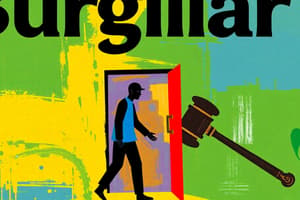Podcast
Questions and Answers
What differentiates burglary from trespassing?
What differentiates burglary from trespassing?
- Trespassing always involves vandalism.
- Burglary requires the intention to commit another crime. (correct)
- Burglary can only occur in residential homes.
- Trespassing involves permission from the owner.
Which of the following enhances the penalties for burglary?
Which of the following enhances the penalties for burglary?
- The suspect leaves the scene without being caught.
- The suspect is of a certain age.
- The dwelling was occupied at the time. (correct)
- The property is individually owned rather than leased.
Which tool is considered a common burglary tool?
Which tool is considered a common burglary tool?
- A rock (correct)
- A toolbox
- A hammer
- A measuring tape
What is a key characteristic of criminal mischief compared to burglary?
What is a key characteristic of criminal mischief compared to burglary?
How can possession of burglary tools be proven?
How can possession of burglary tools be proven?
Flashcards are hidden until you start studying
Study Notes
Distinguishing Crimes: Trespassing, Burglary, and Criminal Mischief
- Trespassing is being on someone else's property without permission.
- Burglary involves unauthorized entry with the intent to commit another crime, like theft.
- Robbery entails forcefully taking property from a person.
- Damage caused during unlawful entry may lead to additional charges of criminal mischief if intentional vandalism occurs.
Burglary Penalties in Florida
- Penalties are enhanced for burglary under specific conditions:
- Assault or battery is committed during the burglary.
- The suspect is armed.
- Property damage exceeds $1,000.
- The property was occupied at the time of the crime.
- A vehicle causes property damage.
Burglary Tools and Methods
- Burglary tools can include common items like screwdrivers, pliers, and even unconventional tools like rocks.
- Common entry techniques involve:
- Using unlocked doors or hidden keys.
- Breaking glass or kicking doors.
- Lock manipulation with various tools like bump keys or electronic devices.
Responding to Burglary
- Burglary investigations are frequent.
- Credit card fraud is felony-level if repeated fraudulent transactions occur within six months or exceed $100.
Credit Card Fraud
- Main complainant is the account holder, while financial institutions are primary victims.
- Victims should report lost cards, check transaction history, and file incident reports with case numbers.
Telephone Scams
- Scammers misrepresent identities to threaten victims into paying fictitious debts.
- Communication can disguise true location and identity, especially with VoIP technologies.
Phishing
- Fake digital communications mimic legitimate businesses to steal personal data.
- Investigators should be cautious, as suspects can hide identities using public Wi-Fi or unsecured networks.
Identity Theft
- Defined as the unlawful use of another's identifying information for fraud.
- Detectives usually handle investigations, assessing jurisdiction based on victim location or crime occurrence.
Recognizing Animal Cruelty
- Signs of animal cruelty include starvation, lack of medical attention, and poor living conditions.
- Florida law includes misdemeanors for neglect and felonies for aggravated cruelty due to severe abuse.
Responding to Animal Cruelty
- Conduct neighborhood canvassing to gather information about the case when animal cruelty is suspected.
Open House Parties
- Legal unless minors consume alcohol or drugs.
- Key conditions for liability:
- Host is 18 or older and allowed underage consumption.
- Agencies often deploy multiple officers due to potential chaotic situations.
- Evidence of intoxication must be documented, and responsible adults may face legal consequences.
Studying That Suits You
Use AI to generate personalized quizzes and flashcards to suit your learning preferences.




